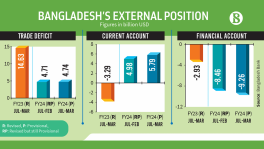Coronavirus pushes China to show mercy rather than pursue companies in court
“Not arresting and not prosecuting means firms can still operate, and still have leeway to be rescued”

Fearful of causing further harm to an economy laid low by the coronavirus epidemic, authorities in China have become a lot more lenient dealing with entrepreneurs breaking the law.
Entrepreneurs suspected of crimes ranging from forging VAT invoices to allowing drug use on their property have been let off with warnings to prevent any further drag on production or employment, according to local media reports.
This leniency contrasts with the harsh treatment meted out to private firms by courts over the past few decades, as many have found themselves on the wrong side of disputes with local governments and state-owned firms, according to legal experts.
"Not arresting and not prosecuting means firms can still operate, and still have leeway to be rescued," said a court official in Zhejiang, a coastal province with a vibrant private sector.
Otherwise the firms could immediately collapse, he told Reuters, declining to give his name due to the sensitivity of the matter.
Shaoxing city in Zhejiang said it decided not to prosecute fourteen private companies in February to help with the return to work after the virus-induced shutdown, according to the state-owned China News Service.
The reason for opting against prosecution in one case was that nearly 70 workers would have lost their jobs.
Leniency has become the order of the day, though the central government has been calling for better treatment of private business for years.
"If it is possible to not arrest them, do not," the Supreme People's Procuratorate, China's national agency in charge of prosecutions, said in February, urging enforcement officers to go easy on key personnel in errant firms.
Business operators who are not dangerous to society and who show remorse after giving themselves up should not be detained, said another document from the agency published last month.
Earlier this month, a Taiwanese factory manager and his company's Taiwanese legal representative received a warning for conspiring to smuggle in Vietnamese workers into their plant in the eastern province of Fujian, according to a local government-backed paper. Had they been tried and convicted, they could have faced up to seven years imprisonment.
Authorities watching companies' compliance with environmental regulations have also become more permissive.
The private sector accounts for 80 percent of urban jobs and most of China's GDP, but many firms faced major disruptions to operations and cash flow during the lockdowns ordered to contain the epidemic.
As new infection rates subsided, authorities gave the all clear for industry to get back to work, but many companies are still wobbling back to life.
China's factory production plunged at the sharpest pace in three decades in the first two months of the year, with the urban jobless rate hitting 6.2 percent in February, the highest since official records were published.
In China, private firms have been especially vulnerable to legal action. Local governments have sometimes characterized cases brought against companies for illegal fundraising, or contract fraud, as attacks on organized crime, say legal experts.
In one ongoing campaign, "obviously innocent people were arrested," said Jiang Su, a law professor at Peking University. Jiang said the prosecutions were sometimes driven by police quotas and local protectionism.
China's Ministry of Justice and the Ministry of Public Security did not respond to faxed requests for comment.


 Keep updated, follow The Business Standard's Google news channel
Keep updated, follow The Business Standard's Google news channel
















